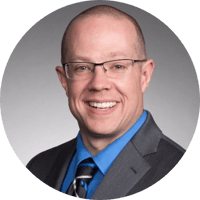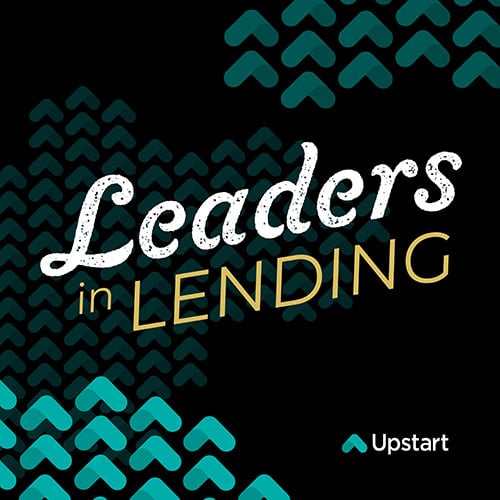Jared Dryer is VP of Consumer Lending and Centralized Deposits at Westerra Credit Union. In his role, Dryer leads Westerra’s consumer business line, specifically overseeing strategy for the credit union’s tech-forward, multi-channel growth in products and services. Prior to his role at Westerra, Dryer served as Senior Director of Consumer Services at Bellco Credit Union. Within that role, Dryer managed all of Consumer Lending, Real Estate and Consumer Deposit portfolios and strategies. Dryer holds an MBA in Strategic Leadership from Amberton University in Texas and graduated with honors from the Western CUNA Management School in Claremont, CA.
Leaders in Lending | Ep. 136
Automated Excellence and Adaptive Automotive
Joining our host Drew Megrey is Jared Dryer, VP of Consumer Lending and Centralized Deposits at Westerra Credit Union. Jared brings a passion for streamlining processes for employees and consumers alike —and he shares insights from his experience in building and implementing an automated decision engine and rethinking the process for underwriting adaptive auto loans.


GUEST SPEAKER
Jared Dryer

ABOUT
Westerra Credit Union
Westerra Credit Union has been in business for 89 years. At nearly $1.7 billion in assets, they are focused on technology and improving member access to financial services. Westerra is implementing new products and adjusting others so that they can effectively meet both the big life events and everyday happenings of their 125,000 members.
Key Topics Covered
- The challenges of rebuilding a consumer lending program
- What factors influence the loan-to-value (LTD) ratio
- Underwriting adaptive auto loans to serve the community
- Predictions about blockchain’s impact on the banking industry

"I knew automation was going to be key to growing those dealer relationships and growing that volume of loan originations through the indirect network."


“I really think credit unions, and potentially even banks, will start to adopt blockchain technology, and even abandon their core systems.”
EPISODE RECAP & SUMMARY
Where do you start if you want to achieve automated excellence?
The answer depends on the company priorities, and it doesn’t happen overnight. That’s where people like Jared Dryer, VP of Consumer Lending and Centralized Deposits at Westerra Credit Union, come in.
Dryer brings a passion for streamlining processes for employees and consumers alike — and holds insights from his experience in building and implementing an automated decision engine and rethinking the process for underwriting adaptive auto loans for the betterment of an entire underserved community.
How Westerra worked towards automated excellence
Dryer’s first move once he had the green light to start transitioning operations to automated systems was to confirm they could build them internally.
“I told the team, ‘It’s going to take a lot of work, it's going to take a lot of time. And so everybody needs to be very patient, but we're going to be able to build it ourselves,’” he said.
To create the best foundation possible, they performed a five-year regression analysis from 2013-2018.
“We picked those years because, in 2021, those loans had all seasoned at least a minimum of three years,” Dryer said. “And most charge-offs happened between 12 and 18 months, so we knew the data was clean and what was performing and what wasn't.”
They broke the data into a few main FICO groupings:
- Loan to value classes
- Debt to income
- Unsecured to income
- Payment to income
From there, they developed heatmaps to determine where they were approving the loans, where they were declining them, and the ultimate disposition: Did they perform or not?
“By doing an overlay of all these heat maps — it was a lot of work because we did this product by product — we layered these heat maps on top of each other and were able to draw rule sets,” Dryer said.
With the data gathered and the rules set, they could turn on their system at 70 percent automation for both approvals and declines combined and catch up with modern expectations. However, Dryer didn't stop there.
Positive community impact through adaptive automotive lending
Automation is not the only “auto” innovation Dryer is passionate about — the world of adaptive automotive may be considered untouchable by most lenders, but he embraces it fully.
“Adaptive autos are handicap-accessible vehicles,” he said. “So for our members that are in wheelchairs or have different paralysis that keeps them from being able to use gas pedals or brake pedals and whatnot, they're able to build these vehicles so they can drive them.”
The adaptive auto community is underserved across the states, mainly because most lenders do not know how to underwrite those deals. Dryer is changing that prerogative.
“Back when I started with Bellco, I would drive to work every single day, and at the off-ramp, the exit to get to one of the branches I ran was an adaptive auto dealership,” he said. “I saw them every day coming in. And I kept thinking, ‘I wonder who's doing their auto loans and who's taking care of them?’”
He drove over to the dealership to find out, only to hear that no one was taking care of them, meaning the customer was responsible for finding financing for their purchase.
“They said most of them are doing home equity, or trying to get money put together from friends and family to buy a vehicle so that they can meet their daily basic needs,” he continued. “A lot of times, they may have a child who's disabled and they need to get them to school, or they live on their own, and they don't have reliable transportation to even get to the grocery store and back.”
Dryer went to his lending team to pitch the dealership's case, pointing to the fact that there isn’t any difference between loans for trucks with lifts and other customization vs cars with accessibility enhancements.
They began adding adaptive auto loans to their services, and Dryer brought that opportunity to his current position at Westerra to continue making a positive community impact — all the automation in the world isn’t worth it if it doesn't provide a tangible, positive influence in the course of people's lives.
Expanding underwriting processes for increased inclusivity
A consistent pain point for adaptive auto dealerships is a lack of options when searching for financing. If they do find one willing to assist, the underwriting paperwork is missing the relevant options in the LOS.
“Someone was financing a $60,000 Honda Odyssey minivan that's five years old, with the Kelley Blue Book on it at $30,000, and they couldn’t get the deal done anywhere. It was because they weren't adding in those additional add-ons, the pieces that were manufactured and built for that van that increased its value.”
When the customer went through the lender's automated LOS to mark what additions the car had, adaptive equipment wasn’t listed as a box to check and, as a result, didn't meet the LTV criteria and got kicked out.
“What we do is we get an invoice on every single deal that we do with them [the dealership]. And we add, dollar for dollar, the equipment into the value of the vehicle,” Dryer said.
As more and more dealerships account for the adaptive auto market, the less it will feel like a risky loan.
“This asset class is actually very, very safe and very low risk because these families need these vehicles to survive,” he said. “I have not had one ever even go delinquent.”
Processes and systems continue to develop as adaptive auto has wider coverage, and the best is yet to come.
Stay tuned for new episodes every week on the Leaders in Lending Podcast.




